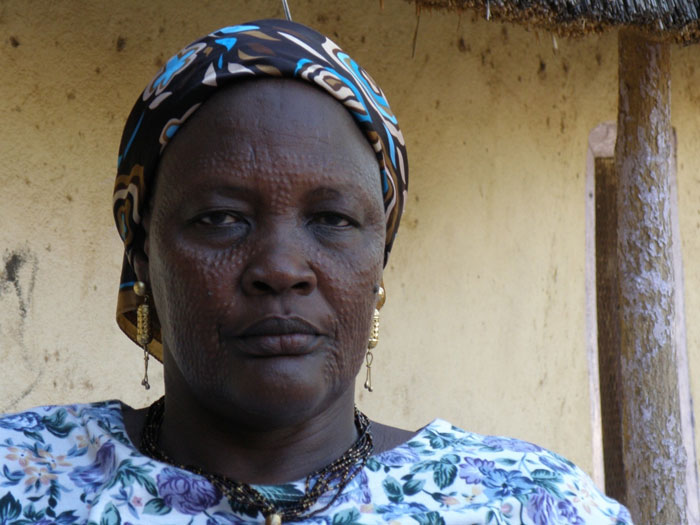‘My name is Rebecca Nyandair Chatiam Deng. I am 53 years old and have eight children, six boys and two girls. I did not go to school and I was married when I was still in the cattle camp. My family is from a place called Kharasana but I was married into Wan-Kay Payam in Mayom County in Unity State in Western Upper Nile. I was displaced from Wan-Kay in April 1998.’

Voices of the victims – Interview
After the CPA, when the Arabs went away, I went back to Wan-Kay with my husband and the smaller children. We lost everything. My family lost four hectares, the luak and the tukhuls. We had six tukhuls and three luaks. We grew sorghum, maize, groundnuts, okra, beans, tomato, sweet yam and we had a small farm for mangoes and bananas and cassava. We used to sell some and some was for consumption.
My uncle and the son of my brother and the wife of my brother were killed when the cattle raiders came. They were burnt inside their tukhul. A lot of people were injured but I can’t remember how many.
They come with horses and they shoot at you, others push you down. When they find you at home they kill you. They burnt the crops, the tukhuls, whatever is of benefit to the human being they don’t want to see. They killed children and raped ladies.
They would also take children. One of my uncle’s sons was taken away but he was found this year, in Barbanusa. He was taken as a cattle keeper. They circumcised the children; they turned them into another society. They told them if you don’t do this you will be killed.
These horse people are the Jaleen. They were sent because of the oil, to frighten the people. This was the beginning.
We had 705 cows in the three luaks. We had some bulls, some heifers; they were mixed. About 37 of the cattle were bulls. When the bulls were grown we sold them and then bought another one. The female ones would produce milk and so we wouldn’t sell that one until it was old.
By that time it was 7000 dinars (about 700 Sudanese pounds) for a bull and about half for the heifers. They were all taken, there was nothing left.
When the grazing was good we would produce milk for selling. A week – but it depended on demand – we made 300 to 350 Sudanese pounds. We would fill gourds in the evening and then again in the morning.
On the day we were displaced we were forced to leave by the Sudan Government. We were waiting for the Chevron to come and open the oil. In 1998 they came and opened it but it was not Chevron.
Soldiers came in big numbers, 15,000 were brought from Rubkona County. They arrested the chiefs. They wanted to arrest my husband but he escaped and went to Abyei Town. They fired at everybody. They killed many. Some of my neighbours died. More than one thousand were killed from my community. We wrote their names down.
After we were displaced we went to Majok in Dinkaland and after that we went to Embefi camp in Uganda. We went by road using SPLA busses and then from Rumbek to Uganda we used public transport.
But from our homes we were running on our feet. Three days we were running before we reached Majok. It was the rainy season. There was a lot of water. I carried my children. The smallest one was on the shoulder and one on each hip. When they attack the family altogether it is not good; some of the family go one way and others the other way. You never know in which way you are running.
We tried to go back in 2005 but we were chased away. But when the soldiers went away we went back again, this year.
The farm, the houses were burnt. They even cut some trees like the mango trees and those others that bore fruit. There is an installation in our old place. Our new place in Wan-Kay is about a kilometre from the first place.
Even now I am not happy. I know when I construct a family in the house, that house can be destroyed. With my neighbours I was told to move this year because they found oil in the ground. This was WNPOC security. We will have another problem in the oil field again.
We are trying to claim for compensation but no one is responding. The chief tried go talk to the South Sudan Government and he went to America and tried to talk to people there. Since Dr. John [Dr. John Garang] died we have never got any person to respond.
There are 60 wells in our area, our payam [district] alone. The governor and the commissioner have agreed with the Government of Southern Sudan, they have shares in the oil so they don’t say anything.”
Interview by Skye Wheeler, Sudan-based journalist
Juba, August 30, 2008



